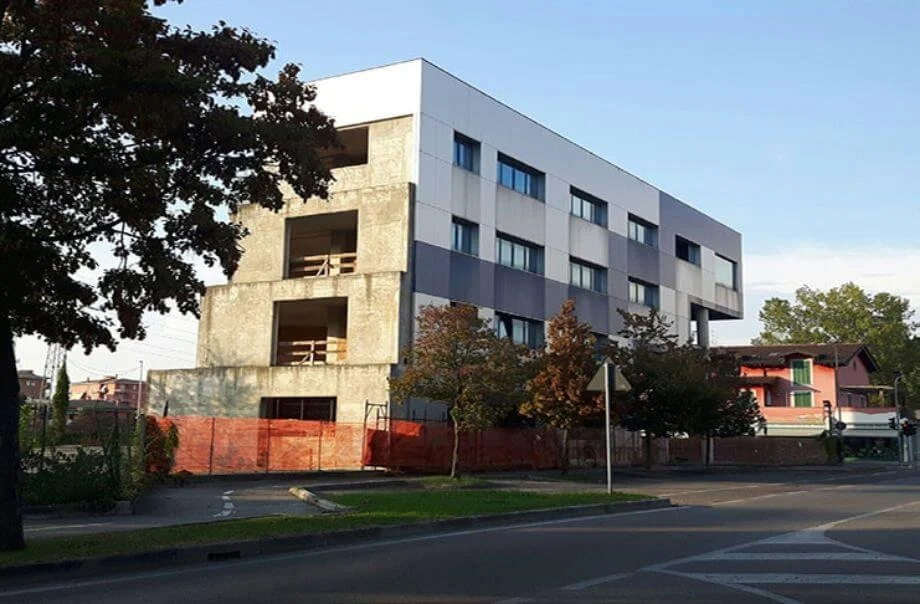Case Studies > Co-Massage


WHY
Talking with some colleagues from the courses during the lunch break, one of the most difficult problems to face for those who want to be a masseur is finding the space in which to welcome their clients.
“I would like to build a studio at home, but I don’t have enough space”
“I would like to open my own studio, but the initial cost is high. What if I can’t afford all the expenses?”
“I’m thinking about finding a partnership using another massage therapist’s office, but it’s hard to find someone I can trust”
The project was born because of a personal experience as a student at a massage school.
The difficulties and risks increase in relation to the city in which you want to operate. A big city offers many opportunities and many customers to retain, but the costs are much higher. However, the opportunities offered by a large city are precisely collaborations and the exchange of knowledge.
What can help masseurs to start to build their own client base and have more certainty about the path to take for their career?

HOW
Bring the concept of Co-Working space, related cost and revenue management.
Where multiple skills come together and work, sharing a common space composed of massage rooms equipped with atmospheres and tools specifically designed for certain protocols.
Renting a space can become a first experiment in personal study and give greater security and consciousness about what to do as a whole.

WHERE
What comes to your mind when you look these images?

WHERE
And what about these, instead?

RENEW SOLUTION
Giving new life to disused structures, to create collaborative spaces to start a new career as a masseur.
Decontract and give new life to these structures by treating them with a holistic restoration.

SPACES HYPOTHESIS
Entrance
Welcome board - Reception / Bar
Signage of massage rooms and work space
Refreshment area
Reception
Posters / Promo / Items for sale
Waiting room for the masseur. Masseur waits here before entering in the room to start his job
Massage room
Shower
Separè to let the customers changing his clothes if requested by the massage
Bathroom sink
Furniture for working equipment
Ergonomic chair
Research, Benchmarks, and Costs
Gathering Cost Estimates for Renovating a Facility
Spaces and required features
Entrance with reception:
Reception: Desk, computer, reception area.
Relaxation Area: 2 sofas.
Bar with 4 tables and 12 chairs:
Tables and chairs, basic bar equipment (coffee machines, refrigerator, etc.).
8 Computer work rooms:
Each room has 3 tables and 9 chairs.
2 Meeting rooms:
Conference table, 10 chairs, monitor/TV for presentations.
2 Small massage rooms:
Massage table, sink, partition, shower.
Ergonomic rooms:
Sink and ergonomic massage chair.
Cost estimate
Basic renovation (including floors, walls, electrical and plumbing systems):
Approximately €500-€1.000 per square meter.
Furniture and furnishings:
Reception + relaxation area: €5.000 - €10.000.
Bar: €10.000 - €15.000.
Computer work rooms: €15.000 - €25.000 (8 rooms).
Meeting rooms: €10.000 - €15.000 (2 rooms).
Massage rooms (small): €10.000 - €20.000 (2 rooms).
Ergonomic rooms: €8.000 - €12.000 (4 rooms).
Specialized systems (air conditioning, professional lighting, etc.):
€10.000 - €30.000, depending on complexity.
Total estimate
The total estimate could range between €150.000 and €250.000, depending on the quality of materials and details. For a more detailed analysis, you might need to consult an architect or engineer to assess specific costs for your area.
10 EU Countries where Co-Working Spaces have been most sought after in the last 5 Years?
Germany
Major cities: Berlin, Munich, Hamburg.
Germany is a hub for tech startups and large corporations, with Berlin leading in demand for co-working spaces.
France
Major cities: Paris, Lyon, Marseille.
Paris has seen significant expansion of co-working spaces, supported by a vibrant startup scene.
Spain
Major cities: Madrid, Barcelona, Valencia.
Barcelona and Madrid are very popular for tech and digital businesses, with strong demand for co-working.
Netherlands
Major cities: Amsterdam, Rotterdam, Utrecht.
Amsterdam is a major center for innovation and technology, with co-working spaces attracting international professionals.
Sweden
Major cities: Stockholm, Gothenburg, Malmö.
Sweden, with Stockholm at its center, is a European leader in tech innovation, with significant growth in co-working spaces.
Portugal
Major cities: Lisbon, Porto.
Lisbon has become one of Europe’s tech and innovation capitals, with significant growth in co-working spaces.
Poland
Major cities: Warsaw, Kraków, Wrocław.
Poland has seen significant expansion in co-working spaces, with Warsaw and Kraków at the center of this growth.
Ireland
Major cities: Dublin, Cork.
Dublin hosts many global tech companies like Google and Facebook, and co-working spaces are growing rapidly.
Italy
Major cities: Milan, Rome, Turin.
Milan in particular has seen an increase in demand for co-working spaces, especially for creative and digital businesses.
Estonia
Major cities: Tallinn, Tartu.
Estonia is one of the most digitized countries in the world, with a thriving startup scene and increasing demand for co-working spaces.
These countries have become major hubs for co-working in Europe due to the growth of startups, tech innovation, and the trend towards remote and flexible work.
10 EU Countries Where Digital Nomads Have Seen Growth in the Last 5 Years?
Portugal
Major cities: Lisbon, Porto, Madeira.
Portugal has become a major hub for digital nomads due to its favorable climate, relatively low costs, and vibrant tech startup scene. Madeira, in particular, has a specific program for digital nomads.
Spain
Major cities: Barcelona, Madrid, Valencia, Canary Islands.
Spain has seen continuous growth in digital nomads, with Barcelona and the Canary Islands being popular destinations due to the climate, culture, and co-working network.
Estonia
Major cities: Tallinn.
Estonia has one of the best digital infrastructures in the world and offers a specific visa for digital nomads, attracting many professionals.
Croatia
Major cities: Zadar, Split, Dubrovnik.
Croatia has introduced a visa for digital nomads, and its coastal cities attract remote workers due to natural beauty and relatively low cost of living.
Malta
Major cities: Valletta, Sliema.
Malta offers warm weather year-round, an expat-friendly environment, and a strong digital ecosystem, making it a haven for digital nomads.
Greece
Major cities: Athens, Crete, Thessaloniki.
Greece has attracted more digital nomads in recent years due to its culture, history, favorable climate, and a new visa for digital nomads.
Romania
Major cities: Bucharest, Cluj-Napoca.
Romania has become an emerging destination for digital nomads due to low cost of living and fast, accessible internet connectivity.
Cyprus
Major cities: Nicosia, Limassol.
Cyprus is attractive to digital nomads for its Mediterranean climate, widespread English, and favorable tax environment.
Germany
Major cities: Berlin, Munich.
·Although living costs are higher, cities like Berlin have long been creative, tech, and multicultural hubs, attracting many digital nomads.
Bulgaria
Major cities: Sofia, Plovdiv.
Bulgaria is appealing to digital nomads due to its low costs, growing startup scene, and good quality of life, with Sofia as a major center.
These countries have attracted digital nomads due to a combination of factors: specific visas, favorable climate, low cost of living, good digital infrastructure, and policies supporting remote work. Countries like Estonia, Croatia, and Greece have made strides by creating visas for digital nomads, while others like Portugal and Spain benefit from established communities of remote workers and tech startups.

ITALY vs SPAIN
I decided to compare these two nations, simply because I was born in Italy and now I’m living in Spain.
Renovation costs in Italy
Renovation costs in Spain
Higher estimates refer to more expensive cities with a more developed real estate market (Milan, Rome, Madrid), while lower estimates refer to cities with a lower cost of living (Naples, Palermo, Alicante).
Expected Growth of Co-Working Spaces and Digital Nomads in the Next 5 Years?
Growth of Co-Working spaces
Co-working spaces have become a fundamental part of the global work landscape, particularly with the shift towards hybrid and remote work models. Forecasts indicate strong expansion:
Compound Annual Growth Rate (CAGR): The global co-working space market is expected to grow at a CAGR of between 12% and 15% from 2023 to 2028, depending on the region.
Revenue: The global co-working space market could reach an estimated value of $16-20 billion by 2028, compared to about $9-11 billion in 2023.
Number of spaces: The number of co-working spaces worldwide is projected to increase from around 30.000 (in 2023) to over 40.000 by 2028.
Work flexibility: Companies will continue to reduce their physical offices and prefer flexible solutions like co-working. This will drive the growth of spaces with varying membership models.
Key trends
Niche spaces: Specialized co-working spaces designed for specific sectors such as technology, creativity, wellness, and even tourism will grow.
Technology and sustainability: There will be increasing demand for advanced technology (5G connectivity, data security, automation) and a strong focus on sustainability, with eco-friendly and "green" spaces.
Corporate adoption: Large corporations, in addition to startups and freelancers, will continue to use co-working for creating satellite offices and regional "hubs" for employees.
Growth of digital nomads
Co-working spaces have become a fundamental part of the global work landscape, particularly with the shift towards hybrid and remote work models. Forecasts indicate strong expansion:
Number of digital nomads: The number of global digital nomads is estimated to exceed 35 million by 2028, compared to about 15-20 million in 2023.
Annual Growth: The digital nomad population is expected to grow at an annual rate of 10-12%, driven by the continued spread of remote work and digital technologies.
Digital Nomad Visas: More countries will offer specific visas for digital nomads, facilitating easier and regulated flows of remote workers. Currently, over 40 countries offer these visas, and the number is set to grow.
Key Trends
Emerging Destinations: Developing countries or those with growing economies, such as Southeast Asia, Eastern Europe, and some parts of Africa, will attract more digital nomads due to lower living costs and increasingly faster internet connections.
Increased Global Mobility: The post-pandemic recovery has reignited international travel, with more workers adopting a "long-term" lifestyle in various countries.
Well-being and Work-Life Balance: Digital nomads will seek destinations that offer high quality of life, access to nature, well-being, and a balanced work culture. Countries with recreational infrastructure and welcoming communities will have a competitive advantage.
Services for Digital Nomads: Demand for specific services will increase, such as co-working spaces, short-term accommodations, online support communities, networking events, and well-being programs designed for remote workers.
Both co-working spaces and digital nomads are expected to grow over the next five years, driven by structural changes in the world of work and the increasing acceptance of remote work.
Companies and professionals will increasingly seek flexible and customized solutions, while the digital nomad economy will evolve to meet their specific needs for mobility, accessibility, and well-being.
Created by Ghozy Muhtarom from Noun Project
Created by N.Style from Noun Project
Created by Karen Santiago from Noun Project

Next case study






































